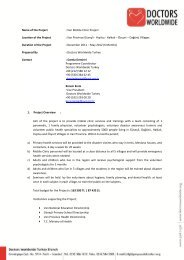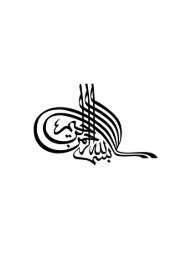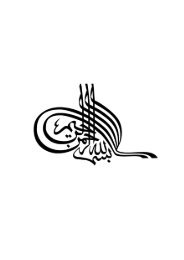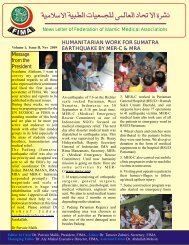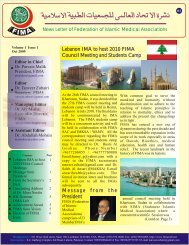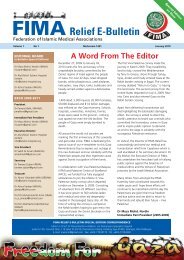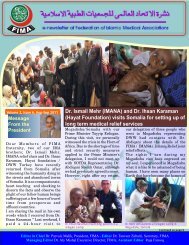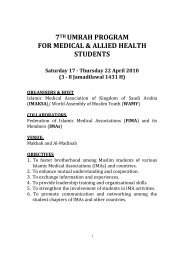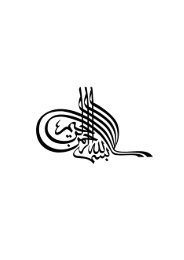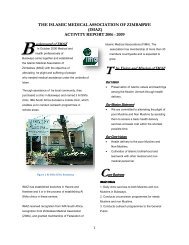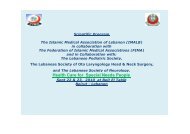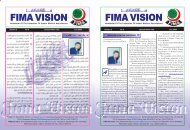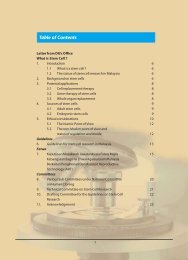FIMA Year Book 2009 - Federation of Islamic Medical Associations
FIMA Year Book 2009 - Federation of Islamic Medical Associations
FIMA Year Book 2009 - Federation of Islamic Medical Associations
Create successful ePaper yourself
Turn your PDF publications into a flip-book with our unique Google optimized e-Paper software.
Workshoptakes charge <strong>of</strong> the group activitiesand a secretary who keeps track <strong>of</strong>discussions and record the decisionmade by the group. All the case studiesportray the lacking <strong>of</strong> pr<strong>of</strong>essionalismand proper physician etiquette, whicheach group has to identify. They shouldthen discuss on how best to treat thepatient (i.e. the Case Study) where theywould be seen as behaving appropriatelyas <strong>Medical</strong> Doctors in terms <strong>of</strong>pr<strong>of</strong>essionalism and proper physicianetiquette. The learning activityprovides opportunities to sharpencommunication skills and to integrate<strong>Islamic</strong> values which are necessaryfor effective and confident interactionwith patients and their families. Italso allows them to appreciate thatmost patient care requires team workthat involves interaction with fellowcolleagues, superiors, subordinates andother health care workers.Conducting the WorkshopMany <strong>of</strong> the lectures covered inthe four-week Elementary Clinicare in consonance to the theme<strong>of</strong> pr<strong>of</strong>essionalism and etiquette.Consequently, these lecture notesbecome important references forstudents in the discussion <strong>of</strong> theCase Studies assigned to them, whichwould be discussed in their respectivegroups. Each group is given a CaseStudy two weeks prior to the workshop.This learning activity is meant to beinteractive and lively where everyonetakes initiative and interest to learnabout medical pr<strong>of</strong>essionalism whichcan be simply defined as values,attitudes and behavior expected bysociety <strong>of</strong> a medical pr<strong>of</strong>essional. Eachgroup is required to demonstrate theirunderstanding on pr<strong>of</strong>essionalism andproper etiquette in managing their‘patient’ (Case Study) using audiovisualaid and other methods suchas role play. They are also requiredto write a report and submit it to thecoordinator/facilitator <strong>of</strong> the workshopon the workshop scheduled day forgrading purposes.This learning methodology is a betterapproach to achieve the novel objectives<strong>of</strong> inculcating medical pr<strong>of</strong>essionalismand proper physician etiquette in theminds <strong>of</strong> our future doctors. Under theguidance <strong>of</strong> medical teachers, medicalstudents learn the importance <strong>of</strong> theseissues and demonstrate them throughdiscussion <strong>of</strong> the Case Studies. Theknowledge and skills acquired at theworkshop would make them moreconfident as they start seeing patientsin the wards and clinics. Eight commonclinical situations, appropriate for theirlevel, are selected for discussions at theworkshop and represent importantthemes listed below:i. The first impression – appearanceand composureii. Examining patient <strong>of</strong> differentgenderiii. <strong>Medical</strong> confidentialityiv. Taking verbal consentv. Refusal <strong>of</strong> treatment and at ownrisk discharge<strong>FIMA</strong> <strong>Year</strong><strong>Book</strong> <strong>2009</strong>68




